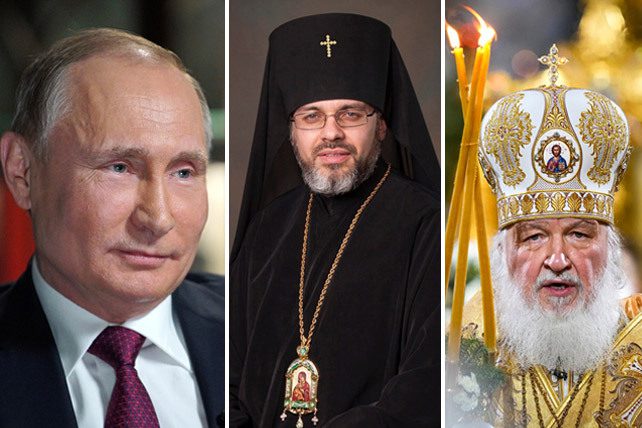We are two distinct groups of people, Russians and Ukrainians. We’re people of one faith — we’re Christians. But our cultural background makes us different. Because of the impact that Western society has had on Ukraine, people the Western Ukraine, and in general in Ukraine, are open to their whole idea of self entities, identifying themselves as Christians and asking themselves valid question, “Why am I a Christian? Why am I Orthodox? Why am I doing the ritual I’m doing? Why am I living the way I live?”
In the northern part, or the northern neighbor, the Russian Federation, they would often use the teachings of the saints of the church and imply that you are not worthy of anything as a person, as a child of God, to accomplish anything in order to fully and truly approach him with your worthiness. Two distinct approaches to the sanctity of human life.
I think you’re saying that, imbued in thinking and practice in faith, the Ukrainian view is one of independence and freedom. Those who profess Orthodoxy are not entirely devoid of their ability to be good. Whereas in the more austere form of Russian Orthodoxy, all of humanity is condemned?
Absolutely.
Ukrainians are striving or trying for centuries to preserve their identity — who they are as children of God.
There was a statement released Wednesday from Moscow Patriarch Kirill. What are your thoughts on that statement? Conciliatory? Goodwill? An appeal of some sort?
A letter from a religious politician, and not a spiritual father of the people of Ukrainian Orthodox Church.
I think Patriarch Kirill is repeating a so-called history lesson we all received from President Vladimir Putin a few days ago. You cannot rewrite the history, Ukrainians and Russians. I’m not being divisive here, but we’re not sharing the same history. Ukraine — Kievan Rus’, not Russia.
To say that we share the same ethnic background and what have you — I think it’s a mistake. It’s an incorrect statement. And I wish the religious leaders would correct that terminology he’s utilizing it. It’s not a brotherly conflict that we’re having in Ukraine. I have a younger brother, and when we were growing up, we had a conflict. We fought over little things. But at the end of the day, we knew we were brothers and we knew we had to respect each other because there was love between us. If you love somebody, as a brother, as a true brother, you’re not going to go and bomb the homes and destroy the lives of people, and then say, “Well, let’s bring humanitarian aid,” and what have you. If you’re truly the spiritual father, as you claim, of the Ukrainian Orthodox Church of Moscow, Patriarchate in Ukraine, then go and confront the political leader of Russian Federation and tell him, “Stop abusing the people of my church.”
What is it important for people in the United States, in particular, to know? Especially those who might say, “I’m not Ukrainian. I don’t know any Ukrainians. Why should we be concerned with Ukrainians? It’s their fight.”
It’s an issue of the crimes against humanity. It’s against who we are as freedom-loving people of God.
If we allow something like this to happen in Ukraine today, then atrocities similar to this will happen in other parts of the world — sanctioning other dictators and political leaders to go ahead and abuse the sanctity of human life. I agree with you — some people may watch and hear reports and watch videos and say, “What do I have to do with Ukraine? I have my own way of life. I live in America. It’s thousands of miles away. As far as I’m concerned, Ukraine is far, far away from here, and it’s not dangerous for me.”
Well, it is. We live in a cosmopolitan society, in a cosmopolitan world. It’s no longer about one single nation here and there, spread around the globe. We’re all interconnected, our economies, our way of life, our cultures. And then there is the very core of our existence: created in the image and likeness of God. We have to keep that in mind. We’re all part of the mystical body of Christ.
Jack Jenkins contributed to this report.
This article originally appeared on ReligionNews.com.


